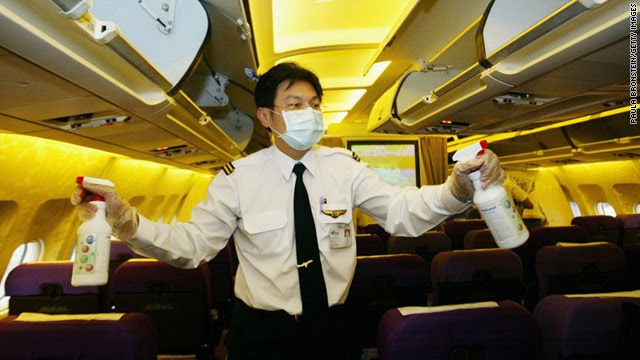
E. coli, can survive for days on planes Ever sit on a plane and wonder how long the germs left by passengers past plan on hanging around?A new study examined how long two potentially deadly bacteria – E. coli and MRSA – can live on various surfaces inside an airplane’s cabin, and how easily they are transmitted by contact.Researchers at Auburn University used actual armrests, toilet flush handles, tray tables, window shades, seats and seat pockets provided by Delta Airlines for the study – inoculating them with bacteria and storing them in conditions meant to simulate a pressurized cabin: 75 degrees Fahrenheit at 20% humidity. In general, bacteria lived longest on the most porous surfaces. For example, MRSA lasted seven days on the cloth seat pocket, six days on the rubber armrest and leather seat, five days on the plastic window shade and tray table, and four days on the steel toilet handle.
E. coli, by one measure, survived four days on the rubber armrest, three days on the plastic tray table, and two days on the steel toilet handle.“In small nooks, like the ones created by a pore, they are protected from environmental stressors like dehydration, UV and disinfectants,” said the lead study author, Kiril Vaglenov.But the same porous material properties that protect bacteria from threats also seem to prevent them from spreading easily.By contrast, the bacteria on less porous materials like tray tables, toilet handles and window shades scored much higher than seat pockets and leather seats for transmissibility – meaning bacteria on these surfaces were far more likely to transfer to human skin."The best thing you can do to protect yourself when flying is: Before you put anything into your mouth, bring some alcohol hand sanitizer and sanitize your hands. It's all about risk mitigation," said Michael Schmidt, a professor of microbiology and immunology at the Medical University of South Carolina.“After I wipe my hands, I use the rest of the alcohol wipe to wipe down the tabletop, just in case I touch it and inadvertently eat something.”The study did not take bacterial samples from actual aircraft cabins.“We have efficient cleaning specifications that are standardized across our entire operation before all departures and on aircraft that remain on the ground overnight,” Delta Airlines said in response to the study. “This includes removing all trash, wiping down all countertops, surfaces and seats, cleaning floors and replacing and restocking pillowcases and blankets among several other procedures.”The study was supported by funds from the Federal Aviation Administration and theAirliner Cabin Environment Research Center.